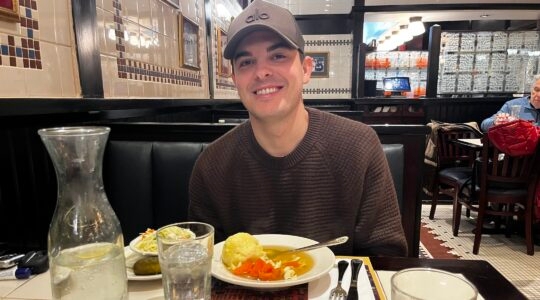With a new Off-Broadway work set in 1930s Nazi Germany, Henry Naylor, a British playwright and satirist, is taking a rapier to what he sees as rising nationalism gripping the globe.
“Games,” which began preview performances on Oct. 10 at the SoHo Playhouse, focuses on two Jewish athletes, a fencer and a high jumper preparing for the infamous 1936 Summer Olympics, dubbed “the Hitler Games.” In its use of a surrogate setting, it follows in the artistic footsteps of “M*A*S*H,” the popular novel, movie and television program that served as a vehicle for criticism of the Vietnam War, though it was actually set during the Korean War.
Naylor, the head writer for “Spitting Image,” a British TV series that used puppets to savage political leaders, is no fan of an authoritarianism he sees infecting Europe and the United States, and he reached back to an earlier incarnation of it.
A dialogue-driven, two-woman play, “Games” features the real-life German athlete Helene Mayer (Lindsay Ryan), the fencer, and Gretel Bergmann (Renita Lewis), the high jumper, both of whom had Jewish ancestry. It is, Naylor says, “a tale about identity, the rise of political extremism and anti-Semitism, which is sadly very relevant for today. Extremism seems to be a growing global problem.”
Naylor’s earlier script contained such lines as “making Germany great again” and “draining the swamp of Weimar.” For a U.S. audience, expect more subtlety, he says.
The playwright’s search for a vehicle to comment on these fraught political times began in an unlikely place, an in an unlikely way: It’s the result of an impromptu conversation two years ago in a bar off the western coast of Africa.
In 2017 he was talking with Avital Lvova, a Latvian-born actress from Germany, who had been performing in a Naylor play in Cape Verde, an island nation near the Canary Islands.
He was looking for a new project, ideally one that would feature the athletic build of Lvova. The playwright and the actress pulled out their smartphones and Googled the words “Jew,” “female athlete” and “Nazi Germany.” Up popped the name Helene Mayer.
Mayer, a world-class fencer from Germany who had a Jewish father and Christian mother, was a pawn of the Nazis. Living and studying safely in the United States in early 1936, Mayer was summoned back to Germany in the months before that year’s Summer Olympics, which Hitler and Germany’s Olympic officials planned to use as a showcase of Aryan superiority and political might.
This, at a time when fencing was a major sport in Germany and other European countries and champion fencers were superstars, the stuff of endorsements and extensive media coverage and autograph-seeking fans.
Considered Jewish by Nazi standards (though not by traditional Jewish matrilineal standards), Mayer was to be the token Jew on Germany’s Olympic team, to disprove critics’ claims of anti-Semitic discrimination and head off a U.S. boycott of the Games.
A stunning blue-eyed blond who did not consider herself Jewish and was fiercely apolitical – naively, in the opinion of many historians – Mayer returned to her homeland; had she not, her relatives who had remained back in the Fatherland might have faced dire consequences. Wearing a swastika on her uniform, she won a silver medal in foil (losing the gold to a Hungarian Jewish opponent), and famously stood on the podium while giving the Nazi salute.
“I had no knowledge of her” before the Google search, Naylor says in a telephone interview. Mayer would turn out to be the perfect vehicle for his next production, which was produced earlier in England, Scotland, Australia and the Czech Republic, using various actresses, including Lvova.
“Games” — the name is an allusion to the high-stakes political chicanery the Nazi hierarchy played, using the two athletes as pawns — features long soliloquies by Mayer and Bergmann and imagined conversations between them; the athletes reflect on the pressures they were facing as high-visibility Jews in a fiercely anti-Jewish society.
There is no record of Mayer and Bergmann meeting, or speaking with each other, Naylor says, but it is likely that they crossed paths at some point.
The bare-bones play, which received enthusiastic reviews in Europe and Australia, is based on extensive historical research and interviews with survivors and refugees from the Holocaust. Naylor’s production accurately portrays Mayer as a dedicated but largely self-obsessed athlete, fencing for personal glory and attempting to regain the Olympic supremacy she had achieved in 1928; Bergmann (who lived and competed in England in 1936, and moved to the United States after the Olympics and was known as Margaret Lambert, her married name) is portrayed as an identified and politically astute Jew who was dropped from the German Olympic team on a flimsy excuse shortly before the Olympic Games began. She remained bitter about the snub throughout much of her life.
Bergmann, who worked and raised her family in Jamaica, Queens, died in 2017 at 103. Mayer, who married but led a more reclusive life, died of cancer in 1953 at 42.
Naylor’s play is faithful to the two women’s lives, he says; he tried to avoid “sensationalizing” their stories “for the sake of making a dramatic point.”
While the principals in “Games” are Jewish, “it’s not just a Jewish story,” he says — its themes are universal. Neither its writer nor its director Darren Lee Cole nor either of the actresses in the New York production are Jews, Naylor points out.
But the two women’s experiences are a reflection of what happened to German Jews in the early days of the Third Reich, says Holocaust expert Michael Berenbaum. “Everyone should know what happened in the Olympics and the way in which the Olympics was used [as a propaganda tool].
“It’s a story worth telling.”
“It has become very important,” says Naylor, “to tell these stories” — of politics and its potential human toll — “to younger generations.”
“Games,” which is in previews for an Oct. 20 opening, runs through Nov. 24 at the SoHo Playhouse, 15 Vandam St., Manhattan. Tickets are $50. For information, go to sohoplayhouse.com.
The New York Jewish Week brings you the stories behind the headlines, keeping you connected to Jewish life in New York. Help sustain the reporting you trust by donating today.




